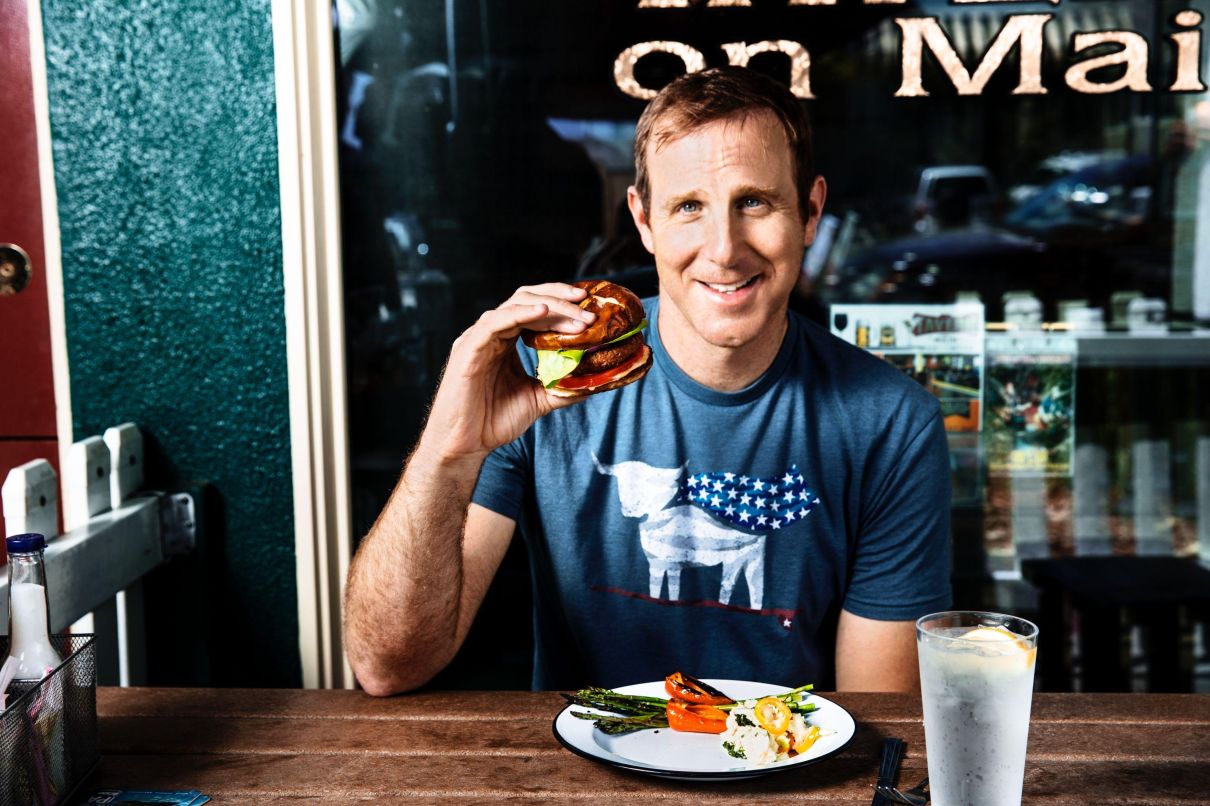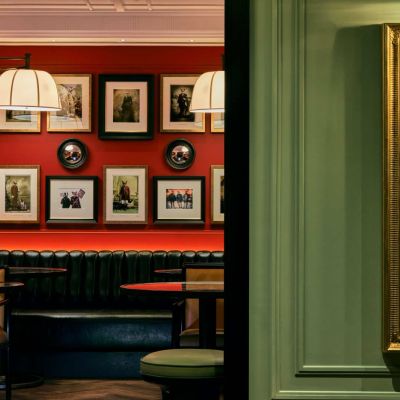How Burgers Could Save The World

Grazing livestock is one of the planet’s biggest threats. Ethan Brown — backed by Bill Gates, Evan Williams and Biz Stone — reckons the humble burger could save it.

If anyone was a posterchild for vegan food, you would not expect it to be Ethan Brown. Six-foot-five of tanned California muscle with a jawline that could cut diamonds, Brown would look equally at home felling timber as he would on a basketball pitch.
But the point that Brown, founder of plant-based meat company Beyond Meat, wants to make is that the diets of red-blooded carnivores and hipster vegans are not so different. Minus a few digestive enzymes and amino acids, everything in the food chain originates from the ground.
“We’re not making meat substitutes, we’re recreating animal protein,” he explains. “If you look at what meat is composed of, it’s five things: amino acids; lipids; a tiny amount of carbs; trace minerals; and water. What the animal is doing is effectively taking materials from plant matter to form new lengths between the proteins and create meat. We’re taking those same elements through the same basic process, including heating, cooling and pressure. We’re just by-passing the animal.”
It was Brown’s early experiences as a child on his father’s Maryland farm that set the ball rolling. “It wasn’t that I saw anything disturbing, but I got to know the animals and I realised they were no different from our pets. That stuck with me,” he recalls. His first foray in business was in alternative energy creating fuel cells — Brown wanted to help the planet. But he couldn’t escape the niggle that no matter how efficient energy is, the number-one climate issue is livestock. Ten times more greenhouse gases are emitted for harvesting a kilo of meat than for a kilo of fruit or vegetables. Raising livestock generates more greenhouse gases, as measured in CO2 equivalent, than driving cars, according to the United Nations.
“In the US we have a tremendous history of efficiency in farming; every year we strive to wring more soy, corn, wheat out of our fields,” says Brown. But although we spend billions on agriculture, human beings haven’t thought to change the “bioreactor system” that our crops run through (i.e. the animal body) since time began, he adds.
And so Beyond Meat was born in LA in 2009, set up with the help of two professors who were experimenting with meatless protein. Brown quit his job, sold his house in Washington DC, and persuaded friends and family to support his fledgling business. But when word got around about the graduate disrupting the meat industry, larger investors began to hover. Venture-capital giant Kleiner Perkins Caufield & Byers was first in, before Bill Gates, Twitter founders Evan Williams and Biz Stone, food conglomerate Tyson Foods and NGO The Humane Society, and many more.
“All of our investors are in it for the desire to make a positive impact on global protein markets — it’s socially oriented investing rather than a pure play investment, which gives us much more freedom to think longer term,” he explains. Supporting meatless alternatives seems a popular investment among billionaires. Bill Gates, Google Ventures and Li Ka-Shing are backers of Brown’s meat-free rival, Impossible Foods; PayPal co-founder Peter Thiel backs Modern Meadow, a start-up aiming to produce three-dimensional bio-printed cuts of meat; while Google co-founder Sergey Brin spent a reported US$330,000 on the development of a lab-grown ‘Franken-Burger’ made from stem cells.
Beyond Meat’s best-selling products are soy-protein chicken strips and pea-protein ‘Beast’ burger patties. Steak and bacon are trickier to make realistic, says Brown, but both, along with chicken breasts, are work in progress.
The real talking point of Beyond Meat is its realism. Vegetarian versions have always been cardboard cousins of the real deal, but Beyond Meat products mimic the exact texture, taste, pre-cooked ‘blood’ (beetroot juice) and even grilling hiss-and-sizzle, as their meaty counterparts. They have the same amount of protein but without gluten, cholesterol, or GMOs. Investor Bill Gates wrote on his blog: “I couldn’t tell the difference between Beyond Meat and real chicken.”
Brown says it is his dream to have the products widespread in Asia, where there is growing status associated with meat consumption. Earlier this year, the brand began that journey with its first international foray in Hong Kong. Local meaterie The Butchers Club now serves Beyond Meat burgers in a brioche bun, complete with gherkins, sliced tomato, grilled vegan cheese and crispy ‘beetroot bacon’ for HK$100 (US$12). At vegan restaurant Green Common, launched by Green Mondays founder David Yeung, you can try Beyond Chicken Hainan Chicken and Beyond Meat Spag Bol, or purchase any of the raw ingredients from its supermarket. “I wouldn’t compare Beyond Meat with other plant-based alternatives; I would compare it to the iPhone or Tesla, because it is, simply, a game-changer,” says Yeung.
One of the main challenges, even in rainbow-coloured LA, is trying to change the mindset that meat is manly and plants are weedy. Everyone knows a macho meat-eater who would balk at the word vegan. Brown gets this question a lot and in fact, it’s the red-blooded machos who are his ultimate target market. “We don’t fancy ourselves in an ivory tower. We are deeply in touch with the consumer; I care much more about the group of guys having a cookout in Kansas City than I do about [the guys in] Silicon Valley.” But this requires a fundamental change in attitude which is no mean feat. Brown recently called in the ad man who made milk sexy by putting it on the top lips of athletes and celebrities as part of the 1990s Got Milk? campaign — to help.
For Brown, his vision is for a day when ordering a plant-based burger becomes as acceptable as ordering fish as opposed to meat. “I want my son and his friends to be able to walk into McDonald’s, order a Beyond Burger and it’s a non-event. Like so-and-so is getting a Filet-O-Fish, I’m getting a plant-based burger. If we can get people to think of these products not as a substitute or a sacrifice, but just a style of meat, we will have enormous adoption.”
This article originally appeared in Billionaire's Future Issue, June 2017. To subscribe contact








